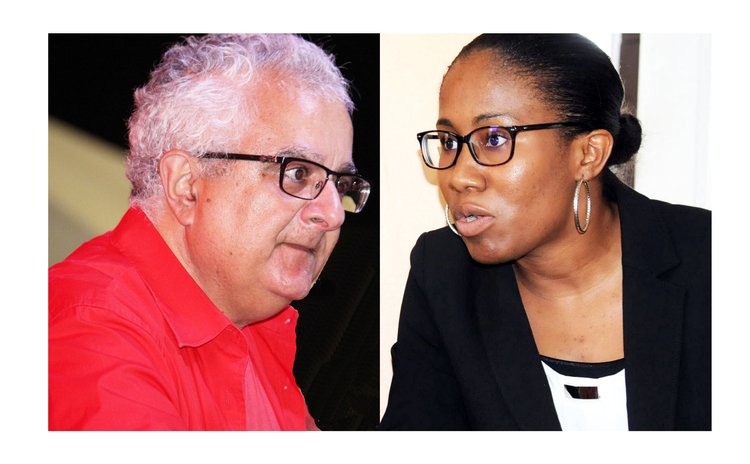Complainant Mervin John Baptiste: "A bittersweet Judgement" from CCJ

Back to square one, a return to the Magistrate court is the order of the Caribbean Court of Justice (CCJ) ruling on the contentious matter of treating in the 2014 general election.
Though many opposes of Dominica's government are elated by the CCJ's judgement on the matter, two of the three claimants termed it "bittersweet" because the ruling came on the day that the other was laid to rest.
"The judgement came with mix emotion," one of the complainants Mervin John Baptiste told The Sun. "It finally came but it was a little too late because my colleague Antoine Defoe even on his sickbed, he wanted justice and it's a pity he died before we received this ruling."
The second complainant, Edingcot St. Valle said: "Defoe died in the pursuit of justice and I'm so sorry that he did not live to see it but as they say, justice delayed is justice denied."
Last week, a unanimous judgment by seven justices from the Caribbean's highest court dismissed an appeal by Senior Counsel Anthony Astaphan on behalf of his client Roosevelt Skerrit and 14 other current and former parliamentarians.
In handing down its judgment, the CCJ dismissed the appeal in the matter of Roosevelt Skerrit & Others v Antoine Defoe & Others and affirmed the order of the Court of Appeal reinstating the Magistrate's summonses for the appellants to appear to answer the election charge of treating.
Treating refers to directly or indirectly providing food, drink or entertainment to a person, during or after an election to corruptly influence that person's vote.
Consequently, the Chief Magistrate shall proceed to assign a Magistrate to hear the complaints filed by the Respondents and the Appellants were also ordered to pay to the Respondents EC$25,000 in costs, in furtherance of the pre-trial agreement between the parties.
The matter dates back to May of 2015 when, John Baptiste, St. Valle and the late Defoe filed a criminal complaint in the Magistrate's court against the Dominica Labour Party (DLP) candidates for treating in the run-up to the December 8, 2014, general election.
The DLP had grabbed 15 of the 21 seats; the United Workers Party (UWP) won six.
The complainants alleged, contrary to section 56 of the House of Assembly (Elections) Act Cap 2:01 ("the Elections Act"), the government ministers worked together to corruptly, directly and/or indirectly influence the results of the poll as they pointed to two free concerts, one featuring three-time Grammy Award winner and international gospel star, Donny McClurkin, and the other by Jamaican Reggae group, Morgan Heritage, that the DLP allegedly used to "corruptly influence" the outcome of the election.
A Magistrate issued summonses against Skerrit and the other elected DLP members who then sought judicial review of the Magistrate's decision to issue the summonses. They argued that the Magistrate lacked the authority to issue the summonses because the offence of treating concerned the validity of the election, and only the High Court could decide this question.
High Court Judge, Justice Bernie Stephenson, decided in favour of Skerrit and his colleagues, ruling that the summonses were invalid and the summonses were quashed.
The matter was then appealed to the Court of Appeal who by a majority, found in favour of the appellants. The court decided that the Elections Act created a summary criminal process and gave the Magistrate power to try and convict any person for treating. That power did not intrude on the power of the High Court to rule on questions of the validity of elections and thereby the membership of the House of Assembly.
This ruling was further appealed; SC Astaphan who disagreed and argued that the Magistrate was not entitled to issue the summonses or try the alleged offences because only the High Court could determine questions regarding the qualification of persons to sit in the House of Assembly. The CCJ heard the appeal on December 10, 2020, and reserved its judgement for a later date.
In a judgment delivered by Honourable Mr. Justice Anderson, JCCJ, he crystallized the issues before the Court as falling under four headings: the 'Parallel Modes of Trial Point'; the 'Constitutionality Point'; the 'Weight of Jurisprudence Point' and the 'Equality before the Law Point'.
The court held that summary proceedings for treating were not brought to determine the validity of someone's membership to the House of Assembly; rather, these proceedings were brought to vindicate the criminal law, or in other words, to try someone accused of committing the offence of treating.
John Baptiste and St. Valle believe that this win is not only for Dominica but the region.
"The politicians of the region now have to stand up or sit down and take note of what they do," St. Valle said. "When people elect you into office, it is to serve them and put things in place to make their life better for them and not to enrich yourself in the process and at the next election cycle because you have so much money you can use it to bribe them."
John Baptiste added that the battle had "just begun,"; he is optimistic that they will get a fair trial in Magistrate court as, "I have seen the performance of both sides and we have been prepared for that case since back in 2014 so with the evidence that we have I am very confident."
The men were represented by Attorney-at-Law, Cara Shillingford and Wayne Benjamin Marsh whilst SC Astaphan led the government's case with assistance from Attorney-at-Law Lennox Lawrence, Heather Felix-Evans and Jodie Luke.




